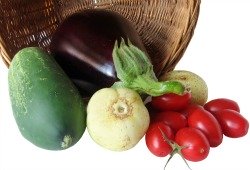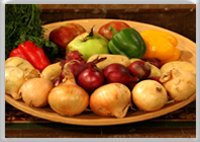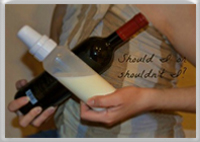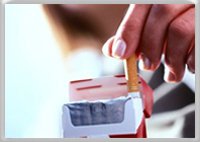Breastfeeding Diet - 3 Things to Consider

Breastfeeding diet is a rather controversial topic. It includes several aspects. It is connected with the subject of breastfeeding nutrition, limiting particular food intakes, and developing food allergies. We will tackle these issues separately.
General opinion about mom's breastfeeding diet is that anything is safe in moderation (even breastfeeding and alcohol consumption and smoking) and no dietary changes are necessary to make healthy milk.
This statement shouldn’t be followed blindly, as there are many important considerations. Here are some of them:
Consideration #1
Lactation is a smart self-maintaining mechanism that serves your baby’s needs. This mechanism is able to pull whatever it needs out of your body reserves to produce healthy milk. When some sources say that you need to increase your intake of particular foods to breastfeed effectively, they are mostly driven by the fact that YOUR body needs that.
Your milk won’t immediately be affected by a single time shortage of proteins. All the nutrients needed for milk production are most easily drawn from your meal. If this protein didn’t come in with the meal, lactation mechanism goes and draws it from your body’s reserves. As a result, your body gets exhausted and tired. Your skin, nails, hair, teeth and bones suffer.
If your diet has been consistently poor (severe cases of eating disorders), your reserves are most likely scarce. In these cases both you and your baby will suffer from malnutrition.
That’s why a healthy well-balanced breastfeeding diet is essential to keep both you and your baby healthy.
Consideration #2
You should take into consideration nutritional requirements. After all, there exists an undeniable proof that your milk is what you eat. Some components have to be present in your diet for a healthy milk composition.
Consideration #3
As far as eliminating particular foods from your diet, different sources express different views. It will make it easier for you to interpret these differences, if you understand this concept first.
Everything we eat leaves a trace in our milk. Babies’ susceptibility to these traces differs. So when you hear that someone ate garlic every day while breastfeeding their baby, and it was fine, treat it sparingly. What’s good for one baby might be totally wrong for another.
The best rule (and the one I followed) is, try a variety breastfeeding diet with all your favorite foods in moderation (provided there is no family history of food allergies). But if your little one starts showing any signs of discomfort, don’t ignore them. Your baby can’t talk yet. These signs are his/her only way of letting you know something is wrong.
This loving and caring breastfeeding approach is the only one that makes you and your baby happy.
What Is a Well-Balanced Breastfeeding Diet?
First of all, there should be a 50%/30%/20% correlation of carbohydrates, fats and proteins, respectively. Based on this a breastfeeding mother should consume daily:
Whole-wheat breads, grains, pasta and rice – 5-10 servings
Vegetables – 5 servings
Fruit – 2-4 servings
Meats, poultry, fish, dried beans, eggs and nuts – 3 servings
Dairy – 3 servings
Here are some general breastfeeding diet guidelines every mother should consider:
- It is best to eat frequent moderate meals rather than fewer big meals.
- Choose healthy snacks: fruit, rice crackers, cheese, nuts.
- You produce most of the milk at night. In the morning you need to restore your body’s used calories. Eat whole-wheat breads or cereals, yogurt, dried fruits, cow’s, almond, or rice milk for breakfast.
- If a food item is available in its raw unprocessed form, choose it instead of cooked or processed foods.
- Try eating natural (if not organic) foods. Food chemicals and contaminants find their way into your milk.
- Give preference to steaming over other cooking methods. Steaming preserves the most of vitamins and minerals.
- Include fermented foods into your diet. Fermented foods contain good bacteria that promote digestive health and drives toxins out of your body. Buttermilk (kefir), yogurt, miso (traditional Japanese fermented seasoning), Japanese plums (sour and salty) are some available fermented foods.
- Eat seeds, nuts and dried fruits daily. Almonds, pumpkin and squash seeds, sesame seeds, Brazilian nuts, prunes, dried apricots, etc. promote normal function of the immune system.
- Season with something you prepare yourself. This is a good advice for everyone. Nowadays, many food additives are found in spices and seasonings. Sesame seeds, herbs, sea salt are perfect for seasoning.
- Sweeten with unrefined sugars or honey.
- Stay away from food additives, preservatives, added color and flavor.
- Choose easily-digestible and fully-absorbed foods. If you suffer from meteorism after your meal, your baby will too.
- Eat lots of fresh fruits and vegetables - the best sources of fiber.
A Note On Water
It once was a common knowledge that a breastfeeding mother should drink a
lot to produce enough milk. It is, however, important to listen to your body. Don’t
let yourself become extremely thirsty, drink every time you need a drink.
Hormone oxytocin stimulates thirst. This way you remember to drink fluids during and after the feeding. But don’t just force gallons of water into yourself.
In fact, too much water can
send the body the wrong signal to produce less milk. As well, water can dilute
the milk in the breast. If your urine is medium to light yellow, you are
getting enough fluids.
It doesn’t have to be water all the time. Caffeine-free teas with some sweetened condensed milk, juices, soups, soy, rice, almond, hazelnut beverages, buttermilk, lactation promoting drinks work too.
You don’t have to drink milk to produce milk either, especially if you normally don’t drink much milk. In fact, recently doctors started associating colic with milk consumption.
Colic is described as a long period of inconsolable crying, usually happens at the same time of the day. Colic usually happens during the first three months of baby’s life. Then it goes away as suddenly as it starts.
Cow’s milk is hard for the babies to digest, especially during the first three months of life. If a breastfeeding mother drinks cow’s milk, it gets into baby’s intestines with the breast milk and may irritate them.
The connection between colic and mom's milk consumption is still widely debated. You have a way to test it though. Try eliminating dairy from your diet. Allow one-two weeks for milk protein to completely clear your and your baby’s digestive systems. If symptoms of colic weaken, you know the answer.
Colic is also associated with milk allergy. If you see a connection between milk in your breastfeeding diet and your baby’s severe colic, talk to your doctor.
Home › Breastfeeding Diet














